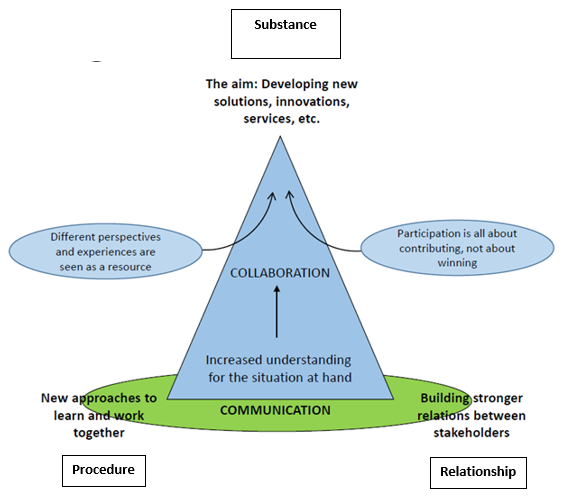The Progress Triangle: Managing substance, procedure and relationships simultaneously
The Progress Triangle: Managing substance, procedure and relationships simultaneously
Magnus Ljung, SLU Sweden
The complexity of many water and land management situations is related to the multiple issues, stakes, goals and parties at hand, as well as the difficulties of predicting the consequences of measures taken in socio-ecological systems. Such complexity suggests that progress is only possible if we continuously learn from our experiences. Three factors can be used to represent the different domains in which progress can occur: relationships, procedures, and substance, labelled “the progress triangle”. Decisions and multi-stakeholder partnerships must consider all these domains: Collaborative water and land management; tools and procedures; strengthening of relationship among involved parties.
This progress triangle also reminds us that substantive progress depends on how good we are at implementing innovative methods. Substance represents the issues (often both practical and scientific) that are to be managed or reached. Procedure and methods represent how we choose to work together, from overall process design to specific tools to reinforce learning. Relationships represent the importance of trust, power equality and constructive dialogue among people involved.

It is important to remember that innovative water management on landscape level always includes the whole triangle. It also means that different perspectives and experiences are resources for learning and that participation is about contributing, not winning. If stakeholders hold such attitudes, the potential for sustained improvements are higher. Furthermore, the three domains overlap and affect one another. By applying new methods and tools we support learning and therefore the outcomes (substance), and if we focus on building trust, we create better preconditions for future collaboration (stronger relationship). Within the Waterdrive project we apply such a perspective when implementing relevant and regionally adapted strategies. Also, when developing a Leadership Manual as part of WP2 we integrate a checklist for local and regional leaders, enabling them to assess the situation, and apply a process design taking the progress triangle seriously.
The progress triangle illustrates how substantial improvements in complex issues are dependent on the procedures used, and the relationships that emerge among the participants. Without a process that tries to manage the true complexity, and without strong relationships between the involved participants, the potential for tangible and sustained improvements of the situation would be very small.


